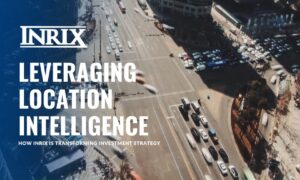Are you ready to take your business to new heights? In a world where data is king, unlocking the power of location intelligence has become essential for businesses looking to stand out from the competition. From understanding customer behavior to optimizing resource allocation, Location-as-a-Service (LaaS) offers a whole new realm of possibilities. In this blog post, we will delve into why businesses should embrace LaaS and discover how it can revolutionize decision-making processes and propel your organization toward success. So fasten your seatbelts as we embark on an exciting journey into the world of location intelligence.
What is LaaS?
LaaS (Location-Aware Service) refers to a new incarnation of software as a service (SaaS) that provides real-time location data. Users can access this information through applications or services on their computer, smartphone, or other device. LaaS can provide insights into where customers are located and what they are doing, improving customer service and product offerings. Businesses can also use LaaS to connect with customers automatically based on their current location, which can be used for marketing purposes or to target sales pitches.
In recent years, businesses have been tasked with becoming more “location aware” in order to better serve their customers. With the ever-growing popularity of smartphones and other mobile devices, it is no surprise that many companies are turning to LaaS in an effort to improve their strategies. LaaS offers businesses a wealth of new possibilities for managing customer interactions and improving business operations.
Here are some specific benefits that businesses can expect from using LaaS:
1) More accurate customer targeting: With access to precise location data, businesses can determine which customers are in close proximity and offer them customized content or services. This allows companies to capitalize on opportunities like social media engagement and cross-selling products while minimizing the risk of annoying customers or losing them entirely.
2) Improved customer service: Providing personalized support based on customer location can be incredibly helpful for resolving issues quickly and efficiently. By pinpointing the nearest customer service representative, businesses can cut down on waiting times and improve the customer experience overall.
3) Increased productivity: With accurate timing data, businesses can gauge how long it takes employees to complete specific tasks. By accurately mapping employee whereabouts, companies can optimize their workflows and save time and money in the process.
4) Insight into customer behavior: LaaS also allows businesses to track customer movements over time in order to better understand their interactions with the brand. This information can be used to devise new marketing strategies or make more informed decisions about product offerings.
While LaaS has a number of potential benefits for businesses of all sizes, it is particularly well-suited for industries like retail, hospitality, and transportation where proximity to customers is essential. In short, LaaS provides an innovative way for companies to stay connected with their customers and better serve them in real time.
How is LaaS Different from GPS?
LaaS (Location-Aware Service) is a groundbreaking new technology that business and government organizations can use to unlock new possibilities for streamlined communication, enhanced decision making, and even faster response time to events. By leveraging LaaS data and analytics capabilities, businesses can improve efficiency in their operations, improved customer experience and more efficient resource allocation.
Compared to traditional GPS, LaaS offers significant advantages for businesses. The primary advantage is the accessibility of real-time data. With GPS platforms, businesses must wait until the device has collected sufficient data before they can make informed decisions or take any action. In contrast, with LaaS systems, businesses have access to live data all the time – enabling them to immediately react to changes in the environment and make informed decisions quickly. This responsiveness allows businesses to respond quickly to opportunities or threats as they occur – improving overall operational efficiency.
Moreover, LaaS is not just about locating objects; it can be used as a platform for collecting all sorts of contextual information about an area including weather conditions, traffic patterns, construction sites and more. This rich contextual data can then be used by businesses for a variety of purposes such as risk assessment, market research and targeted advertising. In addition to providing valuable intelligence gathering services, this contextual data can also be leveraged by business analysts and developers to create localized applications that offer unique tailored experiences specific to a given location or demographic group.
While GPS still plays an important role in many businesses, LaaS systems are becoming increasingly popular for their unique advantages in terms of responsiveness, intelligence and flexibility. As the technology continues to develop, there is no doubt that LaaS will become an even more important tool for business efficiency and growth.
How can LaaS benefit businesses?
LaaS, or “location intelligence as a service,” allows businesses to quickly collect and analyze large amounts of location data in seconds, providing them with new insights into their customers and the surrounding environment. By using LaaS, businesses can unlock new possibilities such as understanding when and where customers are most likely to visit, improve customer engagement through targeted messaging and offers, optimize operations by detecting abnormal patterns in traffic or logistics, and more.
By implementing LaaS in combination with other technologies such as big data analytics and analytical software, businesses can effectively manage their location information and uncover insights that would otherwise be difficult or impossible to obtain. In addition, LaaS can provide a cost-effective solution for managing large quantities of location data that is often tedious or time-consuming to collect manually. By making use of LaaS, businesses can create a powerful toolkit that can help them optimize their operations and better serve their customers.
Case Studies
Location intelligence (LaaS) is a powerful tool that can help businesses unlock new possibilities. Here are five case studies that illustrate why LaaS should be a part of your business strategy.
1. BMW: Using LaaS to Optimize Operations
BMW relies on LaaS to optimize its operations by real-time tracking and recording the current location of all of its vehicles. By knowing where drivers are at any given time, BMW is able to identify bottlenecks and optimize flow in order to increase production and efficiency.
2. Airbnb: Building Better Neighborhoods with Location Intelligence
Airbnb uses LaaS to understand and track the movements of guests in order to help it build better neighborhoods by understanding which areas are seeing the most activity and which areas need improvement. This data can also be used to create predictive models that suggest places where guests might want to stay based on their past activity.
3. Coca-Cola: Improving Retail Outreach with Location Intelligence
Coca-Cola use LaaS to improve retail outreach by real-time detecting when stores are closed or about to close so it can adjust its marketing efforts accordingly. By knowing what stores are closed, Coca-Cola can also target customers who would likely be more likely to purchase their products there instead of at other locations.
4. Walmart: Improving Inventory Management with Location Intelligence
Walmart uses LaaS data in order to manage inventory more efficiently by identifying which products are being bought in greater quantities and where. This data can then be used to create optimal shipping routes, stock shelves more effectively, and plan promotions accordingly.
5. American Express: Creating More Engaging Customer Experiences with Location Intelligence
American Express uses LaaS to understand customer behavior in order to create more engaging experiences. For example, it can use data to identify which areas of the website are being visited the most and recommend offers or content that is likely to be of interest to those locations.
Conclusion
LaaS is a powerful technology that can help businesses unlock new possibilities with their location. By monitoring and analyzing data from multiple sources, LaaS can provide businesses with insights about where they should focus their marketing efforts, how best to manage their inventory, and much more. In addition to helping businesses increase efficiency and streamline operations, LaaS can also help create new opportunities for growth. If your business is interested in exploring the potential benefits of LaaS, please get in touch! We would be happy to offer you a free consultation.



































